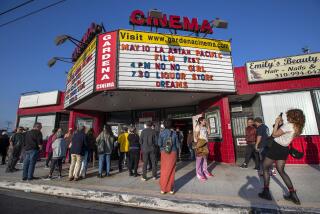Federal Grant Sought to Expand Gardena’s Crowded Meeting Place
- Share via
GARDENA — It was no accident or scheduling error that brought members of the Happiness Club and participants in the city’s congregate meals program to the same meeting room one day earlier this month.
Like most other days at Gardena’s only community center, the social club was conducting its weekly meeting on one side of the portable partition dividing the auditorium while the senior citizens’ meal program was setting up for its daily lunch.
Because of a shortage of space and meeting rooms in the center, “we all share,” said Dorothy Potter, president of the 125-member Happiness Club. “It’s working out all right. You kind of do what you have to,” she said, “but we really need more space.”
Pleas for more space are nothing new to Loyce Holt, the city’s recreation administrator, who has been hearing them for about four years. But now the city hopes to obtain a federal grant to expand the center.
Simultaneous Activities
More room is desperately needed, Holt said. On a typical day, the auditorium seats 125 people for the meal program, 50 to 125 people on the opposite side of the partition for senior citizens’ social meetings and a group of 15 to 40 for Spanish or music classes held on the stage--all at the same time.
“The building has become more and more popular,” Holt said, “and it’s being used more and more. Each group is expanding.” The center accommodates four senior citizens clubs, three English-as-a-second-language classes, special-interest classes, craft workshops and social events.
The Nakoaka Community Center, named for the city’s only mayor of Japanese descent, Ken Nakoaka, was built in 1975 as a multipurpose recreation center with a kitchen, auditorium, five classrooms and offices for the Recreation Department. Before the first year was over, however, the city began a daily meals program for the elderly, using the kitchen and auditorium.
Seniors Moved In
In 1981, the city lost its lease on the building housing its Senior Citizens Bureau so it moved the bureau into the community center. In addition to sharing the auditorium and kitchen, the seniors’ bureau moved into one of the five classrooms.
Activities for senior citizens now take an average of eight of the 14 hours the center is open each day and account for more than half of the center’s total attendance of about 165,000 each year.
“It was not geared to become just a building for senior citizens. But basically that’s what it has become during the day until about 3 p.m.,” Holt said. “There’s no room available for anybody else to use the building except after that time.”
The city applied last month for a $275,000 federal grant through the Senior Center Bond Act of 1984 to expand the facility. If the grant is approved, the city will add $100,000, said Gail Doi, city grants administrator. She expects a decision by the end of the year.
Expansion Plans
The 2,500-foot expansion would provide two classrooms, five offices, an elevator and small coffee area for the clubs. The seniors bureau would vacate the classroom it uses as an office.
But getting the grant is going to be tough, Doi said. The money is administered by the county, and only about $961,000 has been allotted for Kenneth Hahn’s supervisorial district, which includes Gardena.
The prospect of an expansion delights Mary Cambra, director of the seniors’ bureau, who said it will ease the space problems.
“This expansion would really enhance the opportunities for seniors,” she said, anticipating such additions as educational programs in retirement planning and counseling, volunteer training for senior citizens and health services.
Kitchen Needed
But leaders of three of the four social clubs said the center needs another full kitchen for potluck suppers.
“It would mean a whole lot more if they could see their way to put a small kitchen in there for the clubs,” said Nan Snavely, president of the Gardena Senior Citizen Club.
Holt acknowledged that the expansion would not be a cure-all. “We’re not going to completely alleviate the problem with the kitchen. There’s always going to be a problem there,” she said. “But we can get the people off the stage.”
More to Read
Sign up for Essential California
The most important California stories and recommendations in your inbox every morning.
You may occasionally receive promotional content from the Los Angeles Times.













